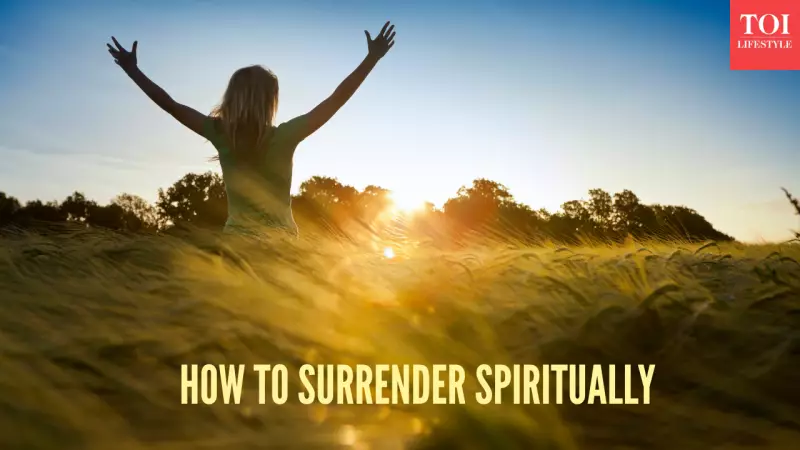
In a society that constantly celebrates hustle culture, willpower, and fierce independence, the very notion of surrender can feel uncomfortable. It often sounds synonymous with giving up, losing control, or passively accepting whatever life throws your way. However, within spiritual traditions, surrender carries a profoundly different and empowering meaning.
Surrender is Not Defeat, It's Wisdom
The spiritual interpretation of surrender has nothing to do with weakness or resignation. It is, in fact, an act of profound wisdom. It is the quiet understanding that trying to control every outcome is not true power. True surrender is the art of releasing resistance while remaining fully engaged with life. It involves trusting a deeper intelligence—whether you call it God, the Universe, or simply life's natural flow—instead of being driven by an anxious need to micromanage every result.
This concept is far from passive. Spiritual surrender does not mean sitting back idly and waiting for fate to take its course. It is not about laziness or indifference. On the contrary, it often demands more strength than the exhausting effort of control. It asks you to do your very best, to think clearly, to act with integrity, and to make sincere efforts, all while letting go of any attachment to the results.
This philosophy is beautifully encapsulated in the Bhagavad Gita, which states, "You have a right to your actions, but not to the fruits of your actions." This single line captures the core of surrender: focus intensely on the task at hand, but release the clinging to how it should turn out. Imagine rowing a boat with an awareness of the current versus fighting against it because you believe it should flow in your direction. The first is active alignment; the second is ego-driven exhaustion.
The Battle with the Ego and the Path to Inner Peace
The most significant obstacle to surrender is the ego. That small, fearful voice inside us equates letting go with loss. It creates narratives like, "If I don't control this, I will fail," or "If I release my grip, something terrible will happen." The truth, however, is that much of what we perceive as control is merely an illusion. We can influence situations, but we cannot dictate how other people feel, how time unfolds, or how destiny arranges itself.
Surrender is about seeing reality with clear eyes, recognizing where your personal power ends and where grace begins. When the ego stops its relentless fight, what emerges is a profound clarity. Choices become simpler. The mind ceases to manufacture endless tension, and life no longer feels like a constant, grueling test.
This process is not about submitting to an external authority. It is about aligning with your own inner truth. It's a shift from aggressively pushing life in a desired direction to quietly listening to what it is showing you. In this receptive space, your intuition grows sharper. You begin to sense intuitively when to act, when to wait patiently, and when to simply release. You do not abandon action; you refine it. Every step feels lighter because it feels guided, not forced.
The Transformative Outcome: From Struggle to Effortless Flow
When genuine surrender occurs, your entire nervous system begins to soften. A deep sense of relief washes over you—not because everything is suddenly perfect, but because you have stopped fighting against what is. The inner monologue of "Why is this happening to me?" transforms into "What is this trying to teach me?"
You can still wish, dream, plan, and act, but without the familiar poison of anxiety tainting the process. This calm acceptance does not dull your ambition; instead, it purifies it. You continue to move forward, but the desperation is gone. In that peace, something beautiful blossoms: gratitude gradually takes the place of fear. You start to see how even life's delays, rejections, and unexpected detours can carry a hidden kindness.
The great paradox is that surrender often brings more strength, not less. When you cease wasting vital energy resisting reality, that same energy returns to you as clarity, resilience, and creativity. You learn to respond to situations instead of merely reacting to them. You stop being a puppet controlled by outcomes and start becoming a conscious participant in the flow of life.
Surrender does not shrink your world; it expands it. You discover that life's intelligence is far vaster and more intricate than your personal plans. As you align with this flow, synchronicities begin to appear, relationships soften, and your sense of timing improves. Things you once chased frantically begin to find you.
To surrender spiritually is to trust a fundamental truth: what is truly meant for you cannot be lost, and what is not meant for you cannot be held by force. It is to rest in the deep knowing that life, in its own perfect timing, is always working in your favor, even when appearances suggest otherwise. This does not mean abandoning effort. It means infusing your efforts with faith. It is a daily practice—in traffic jams, in heartbreak, in moments of great uncertainty—of gently loosening your grip and whispering inwardly, "I trust the process." This is the real heart of surrender: a quiet courage that no longer needs to control every single chapter, because it has learned to trust the author of the story itself.






